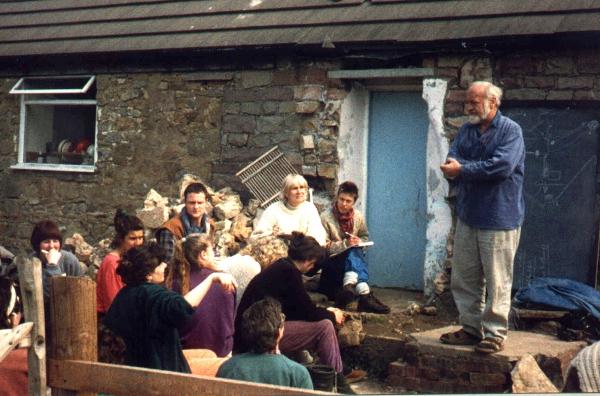
Permaculture is about designing systems based on the principles of the natural world. The philosophy behind permaculture is one of working with, rather than against, nature; of protracted and thoughtful observation rather than protracted and thoughtless action; of looking at systems in all their functions, rather than asking only one yield of them; and allowing systems to demonstrate their own evolutions.
| "Permaculture design is a system of assembling conceptual, material, and strategic components in a pattern which functions to benefit life in all its forms." |
Permaculture started out as "permanent agriculture", as a response to the destructive power of modern agriculture. The concept (and the word itself) was developed in Tasmania in the 1970's by two renegade academics, Bill Mollison and David Holmgren. The very beginning of it all is described in a fine short article by David. Their partnership led to a precise definition of their approach which gave a stable foundation for future development of the discipline.
| "Permaculture is the conscious design and maintenance of agriculturally productive ecosystems which have the diversity, the stability, and the resilience of natural ecosystems. It is the harmonious integration of landscape and people providing their food, energy, shelter, and other material and non-material needs in a sustainable way. Without permanent agriculture there is no possibility of a stable social order". |
Permaculture quickly moved to a recognition that our real problems lie in our own culture ("the way we do things round here") . These problems are not just the destruction of soils and the pollution of waters, but also with our use of energy and material resources.
In colder climates, a large part of permaculture design work needs to be directed towards buildings and our towns and cities. Without a permanence in our culture, there is no possibility of a stable social order for us, here.
| "... we can build a global, interdependent and co-operative body of people involved in ethical land and resource use, whose teaching is founded on research, but is also locally available everywhere, and locally demonstrable in many thousands of small enterprises covering the whole range of human endeavours from primary production to quaternary systems management; from domestic nutrition and economy to a global network of small financial systems. Such work is urgent, important and necessary, and we cannot leave it to the whims of government (always short-term) or industry as we know it today." |
We are asking everyone to respect the origins and use of the word "permaculture" according to our international protocols.
With acknowledgement of text and quotes from "Permaculture - A Designers' Manual" written by Bill Mollison and published by Tagari Press in 1988.
